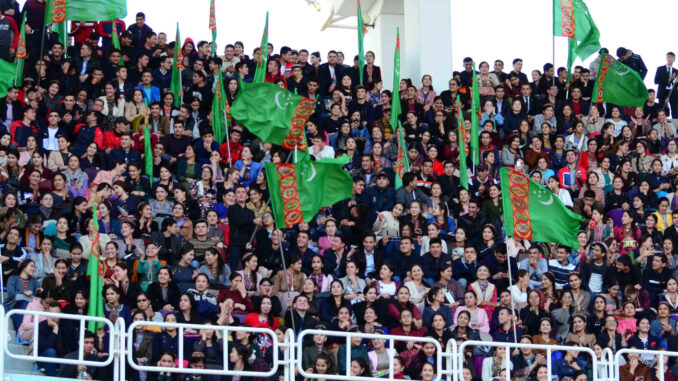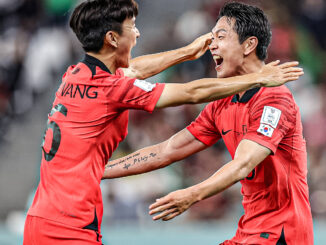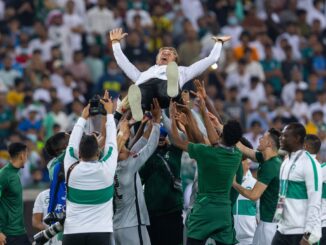
There are few teams the world over, that mix intrigue with a genuine shock factor the way Turkmenistan and its domestic football scene does.
Yet as we set ourselves up for the final run at the second round of FIFA World Cup qualification over the next couple of weeks, we’ll probably look back at this as a cruelly missed opportunity to realise the men in green’s full potential.
Back in November 2019, Turkmenistan stood proudly atop of Group H. That was above the likes of Lebanon and continental heavyweights South Korea, having just recorded back-to-back home victories against North Korea and Sri Lanka, scoring five goals over the week.
Modest enough were their ambitions, Turkmenistan now headed into their final three matches in a steady position; away against South Korea – a free hit if anything else – home against Lebanon, a side they narrowly lost to in Beirut and a final day trip to Pyongyang to face North Korea.
While optimistic, six points from the latter two matches of the campaign would put them in good stead to seal second spot and potentially reach the final round of World Cup qualification.
That’s the point at which you pinch yourself, as Turkmen fans may have wanted to do 18 months ago.
All this from a side who barely deserved AFC Asian Cup qualification three years ago. A team as illusive as their Group H competitors North Korea, in a country continuing to glide beneath public consciousness despite its quite unique, to say the least, social backdrop.
Turkmenistan, since it’s Soviet Union split, has arguably been the most closed off of all the Central Asian nations that broke off West.
Under president Gurbanguly Berdimuhamedov, the country has remained locked down to external media influence, only leaning on the likes of Russia and China, merely for leverage and resource, it remains an amateur political establishment yet a very rich one.
The disparity is vast, with fortunes from their plentiful gas reserves rarely seeing the light of day outside the marble encased capital of Ashgabat, an image reguarly rammed down the throats of any unsuspecting local television viewer.
It makes sense then that their football scene should replicate such a state; a closed, externally controlled domestic game, with little outside scrutiny and a clear hierarchy. Manipulation is commonplace, with matches only on occasion replayed in their entirety on national television, and almost exclusively never live.
This oddity in practice collided comically with the Western world of sports betting during quieter COVID months last year. When a “live” match is reported differently by different entities, how can a bet ever be legitimised? Given Turkmen football’s habit of reclassifying results post-match, the answer is it can’t.
With such predictable instability, the structure of the country’s domestic league – the Turkmen Yokary Liga – was pedestrianly uniform, in recent years built and sourced around one team, Altyn Asyr.
The 2018 AFC Cup finalists, and seven-time consecutive domestic champions, named after the communications company of the same name, have been rampant in their fleeting 13 years since formation.
Rather than add to the competitive nature of the domestic league, they’ve instead acted as a vacuum for talent; with little in the way of imports, Altyn Asyr have been able to drain the competition without contest.
A change to the state of play occurred, however, upon Turkmenistan’s completion of the Asian Cup in 2019. A tournament in which they scraped qualification, thanks to the newly adopted expansion, Turkmenistan predictably exited without a point; but memorably led eventual finalists Japan for half an hour in the opening match.
This seemed to spur a change in the direction of Turkmen football. Incestuous by nature, the national team became almost a carbon copy of their champion.
With legendary domestic coach Yazguly Hojageldyyev working the manager role of both club and country in tandem, he mitigated against any variation, selecting only a few outside his trusted Altyn Asyr circle to represent the national team.
Post-Asian Cup, the TFF turned extrovert, signing a memorandum of understanding with the Croatian Football Federation, appointing Ante Miše as their new coach.
The CFF’s involvement via Miše looked to overhaul both domestic and international footballing practices; promoting youth, strengthening the Turkmen second tier, organising overseas friendlies and recalibrating their style of play.
From a restricted landscape that encouraged players to sign for Altyn Asyr if they wanted to represent their country, a clean slate saw talent once again move around at will.
Players based overseas were again being selected, while Altyn Asyr’s capital rivals Ahal started to become an even more integral part of any given Turkmen call up.
Ahal, whilst experiencing the unenviable record of four runners up spots in a row, are in fact the most aesthetically appealing Yokary Liga team, benefitting from a more Euro-centric possession based game that has on occasion threatened the more direct and physical style of Altyn Asyr.
Miše’s approach for the national team, rather than progressing with the previous Hojageldyyev base, went about revolutionising their style to start on the front foot.
The expanded Asian Cup in the UAE will long been seen as the turning point in Central Asian football; from the peripheries, the likes of Kyrgyzstan under Aleksandr Krestinin and Tajikistan under Usmon Toshev have grown to become a thorn in the Asian elite sides. Not from only experiencing the tournament but from seeing the opportunity to qualify and progress. Turkmenistan under Miše rode the same wave of optimism.
Miše’s modern looking, flexible 3-5-2 – a world away from the kick and rush Challenge Cup days – made an instant impact, especially at home, in their newly refurbished Ashgabat Stadium.
After a narrow defeat to South Korea, followed by victories against North Korea and Sri Lanka, it was clear they weren’t merely going to hang on to what they already had, as they prepared for the run in.
What happened next you may wonder, but the answer is simple. The COVID pandemic halted football worldwide (even if the Yokary Liga, backed by attending fans throughout only “paused” for three weeks), and with it came disruption for Turkmenistan.
At the prospect of sitting inactive for a year, Miše left, eventually moving to Kuwait, winning a historic title with Al-Arabi last month.
Could the team replicate what they did with Miše once the Croat exited? I suppose that’s still to be determined, as their final run of games were moved to South Korea for the centralised run in of Round 2 fixtures.
All remained on track until last month, as North Korea withdrew due to COVID concerns.
FIFA’s resulting expulsion and cancellation of results swung things away from the Turkmen national side, falling from first to third, losing out on their victory secured against North Korea back in November, and their rivals accruing ground they’d initially lost.
In the blink of an eye, an off-the-field political hand, outside of their control, effectively eliminated Turkmenistan from World Cup qualification.
Saturday’s match with South Korea will likely be their last chance to cling on, defeat almost certainly sees their Road to Qatar dream end. Given the highs of 18 months ago, few campaigns could’ve been hit harder than Turkmenistan’s has due to the COVID pandemic.
Cruelly still, this telling blow comes only weeks on from their domestic outfits shining performances in the AFC Cup.
Altyn Asyr impressed with a goal fest victory against Alay Osh of Kyrgyzstan, before drawing with Khujand of Tajikistan; credible given Tajik champions Istiklol’s performances in the Champions League a month earlier.
But it was Ahal, so long the bridesmaid domestically, who stole the headlines. Victories over Dordoi and Ravshan secured a Zonal Final for the first time in their history, squaring up with former winners Nasaf Qarshi.
But it was in the manner and individual displays that stood out – Elman Tagayev scored four over two matches, while Resul Hojayev and Abdy Basimov also caught the eye – and reignited the fire beneath Turkmen football. A fire that was transferred to the national team setup so well by Miše two years ago.
Last month’s news was greeted by some with relief, while others, like Turkmenistan, it was met with crippling despair; a harsh off-field decision which has shifted the balance irrefutably.
As Turkmenistan lineup this weekend against South Korea, having lay dormant for almost two years, it’s hard to grasp how close they were to the significant national pride and continental shock that stood in front of them.
Photo: Asian Football Confederation
Listen to Episode 69 of The Asian Game podcast as we preview the resumption of FIFA World Cup qualifying




